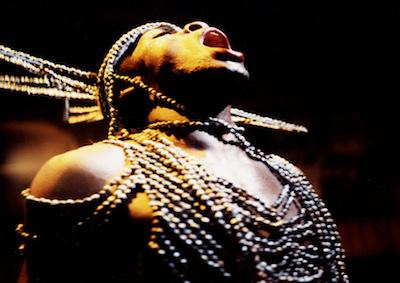Madame Satã
Brazil, 2002
Director Karim Aïnouz brings a visceral, sensuous take to the biopic well suited to his subject, João Francisco dos Santos. The Afro-Brazilian descendant of enslaved people, dos Santos became a living legend as an openly gay, street-fighting cabaret star whose drag persona Madame Satã (after DeMille’s Madame Satan) revolutionized Brazilian Carnival culture in the 1940s. The film begins years before when dos Santos (Lázaro Ramos) was still just an outlaw hustling in Lapa, Rio de Janeiro’s crumbling red light district. A master of capoeira with an affinity for Scheherazade and Josephine Baker, dos Santos battles cops and cons alike, drawing around him a tender family of outcasts, sex workers and petty thieves. Lázaro Ramos channels these seeming contradictions into a stunning performance cultimating in Madame Satã’s first appearance on stage. 20 years after its original release, Madame Satã still seethes with liberating energy from start to finish.
35mm, color, in Portuguese with English subtitles, 105 min. Director: Karim Aïnouz. Screenwriter: Karim Aïnouz, Marcelo Gomes, Sérgio Machado, Mauricio Zacharias. With: Lázaro Ramos, Marcélia Cartaxo, Flávio Bauraqui.
Co-presented with Film Quarterly
Special thanks to our community partners: UCLA LGBTQ Campus Resource Center, UCLA Latin American Institute and Center for Brazilian Studies.






 Mobile Navigation
Mobile Navigation

